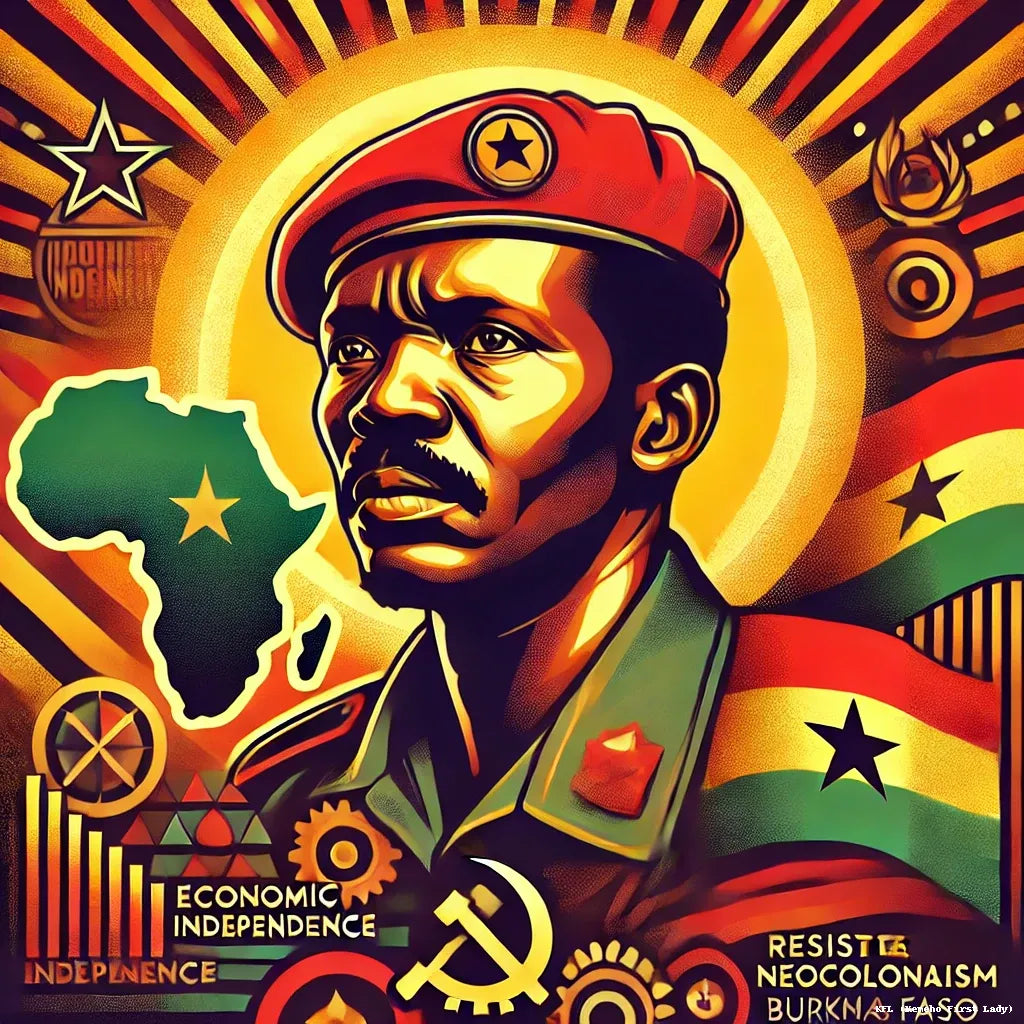
Thomas Sankara: The African Che Guevara and the Icon of the Burkinabe Revolution
Share Label
Thomas Sankara, often called the "African Che Guevara," is one of the most iconic figures of Pan-Africanism and revolution in Africa. President of Burkina Faso from 1983 to 1987, he embodied the hope for a free, sovereign Africa, freed from neo-colonialism. As a bold reformer, he implemented revolutionary policies for the development of Burkina Faso before being tragically assassinated at the age of 37. His legacy continues to inspire generations of African militants and leaders.
1. The Rise of a Revolutionary Leader Thomas Sankara was born on December 21, 1949, in Yako, in Haute-Volta (now Burkina Faso). He joined the military at an early age, distinguishing himself through his intelligence and patriotic commitment.
- He trained in Madagascar, where he discovered national liberation movements and revolutionary ideologies.
- Upon returning to Haute-Volta, he became an influential officer, critical of injustices and foreign interference.
- In 1983, at the age of 33, he came to power after a coup d’état supported by his friend and fellow revolutionary Blaise Compaoré.
2. Major Reforms under Sankara: A Revolution for the People Upon taking office, Thomas Sankara launched a series of radical reforms to transform his country and break free from neo-colonial dependence.
-
Renaming the Country: He renamed Haute-Volta to Burkina Faso, which means "Land of Upright Men" in Mooré and Dioula.
-
Autonomy and Food Self-Sufficiency:
- He encouraged local production and banned the importation of food products that Burkina Faso could produce.
- He implemented agricultural policies to achieve food self-sufficiency.
- In four years, the country doubled its cereal production.
-
Health and Education:
- Sankara launched a massive vaccination campaign against meningitis, measles, and yellow fever, saving thousands of children.
- He implemented an educational policy aimed at eradicating illiteracy.
-
Promotion of Women's Rights:
- Sankara outlawed female genital mutilation, forced marriages, and polygamy.
- He appointed women to key positions of responsibility.
- He encouraged women to join the military and engage in politics.
-
Fight Against Corruption and Government Waste:
- He reduced ministers’ salaries and prohibited unnecessary privileges.
- Sankara sold off the luxurious government fleet of cars and imposed the Renault 5 as the official car.
- He refused foreign aid, stating that Africa must learn to stand on its own.
3. His Struggle Against Neo-Colonialism and Imperialism Thomas Sankara didn’t just reform his country, he became a strong voice against neo-colonialism.
- He publicly condemned Africa’s debt, calling it "a new form of slavery."
- He advocated for African unity to counter the influence of former colonial powers.
- He opposed multinational corporations exploiting the continent's resources without benefits for the local populations.
His memorable speech at the Organization of African Unity (OAU) in 1987 remains a reference for Pan-Africanists.
4. Sankara's Assassination and His Legacy On October 15, 1987, Thomas Sankara was assassinated during a coup orchestrated by Blaise Compaoré, his former ally turned rival.
- His assassination marked the brutal end of his reforms and the return of governance more favorable to Western interests.
- For decades, his legacy was obscured, but he became a legendary figure of African resistance.
- In 2021, Blaise Compaoré was finally sentenced for his role in Sankara’s assassination, although the full truth remains buried.
5. Sankara’s Legacy Today Although Sankara was killed, his ideas continue to inspire political, Pan-African, and revolutionary movements worldwide.
- Many young Africans see him as a model of upright leadership and visionary thinking.
- Initiatives inspired by his policies have been revived in Burkina Faso and other parts of Africa.
- His message of economic independence and African sovereignty remains more relevant than ever.
Conclusion Thomas Sankara was much more than a president; he was a symbol of struggle, integrity, and radical transformation. His commitment to the people of Burkina Faso, his rejection of neo-colonialism, and his vision of an autonomous Africa make him a timeless figure. Though betrayed and assassinated, his spirit still lives on in every fight for justice and African sovereignty. His name remains etched in history as that of a revolutionary who dreamed of a free and proud Africa.









